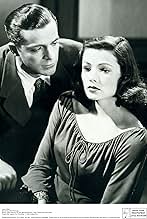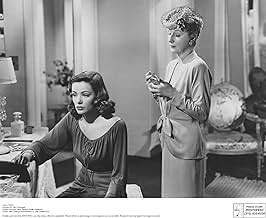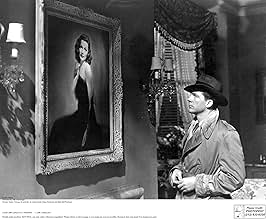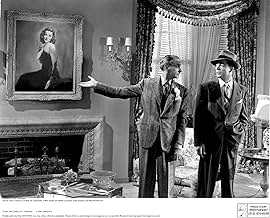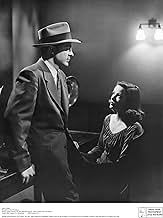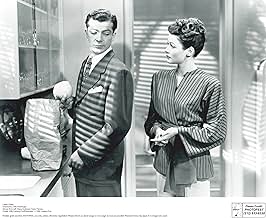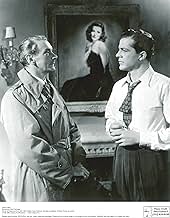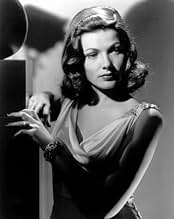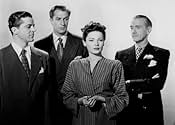IMDb रेटिंग
7.9/10
54 हज़ार
आपकी रेटिंग
एक पुलिस जासूस को उस महिला से प्यार हो जाता है जिसकी हत्या की वह जांच कर रहा है।.एक पुलिस जासूस को उस महिला से प्यार हो जाता है जिसकी हत्या की वह जांच कर रहा है।.एक पुलिस जासूस को उस महिला से प्यार हो जाता है जिसकी हत्या की वह जांच कर रहा है।.
- 1 ऑस्कर जीते
- 7 जीत और कुल 5 नामांकन
Grant Mitchell
- Lancaster Corey
- (काटे गए सीन)
Dorothy Adams
- Bessie Clary - Laura's Maid
- (बिना क्रेडिट के)
Terry Adams
- Woman
- (बिना क्रेडिट के)
John Alban
- Executive
- (बिना क्रेडिट के)
Wally Albright
- Newsboy
- (बिना क्रेडिट के)
Bobby Barber
- Newsboy
- (बिना क्रेडिट के)
Edward Biby
- Party Guest
- (बिना क्रेडिट के)
Gary Breckner
- Narrator
- (बिना क्रेडिट के)
James Carlisle
- Party Guest
- (बिना क्रेडिट के)
Harry Carter
- Party Guest
- (बिना क्रेडिट के)
Lane Chandler
- Detective
- (बिना क्रेडिट के)
Bill Chaney
- Newsboy
- (बिना क्रेडिट के)
Dorothy Christy
- Woman
- (बिना क्रेडिट के)
फ़ीचर्ड समीक्षाएं
Laura is another brilliant addition to Hollywood's golden age with its incredible screenplay and a great non linear narrative structure. While it might not reach the heights of Double Indemnity or The Third Man, it is still a fantastic motion picture.
One thing that never seems to disappoint about ( Most of ) the classic Hollywood Film-Noirs is that they have incredible writing, and Laura is no different. The dialogue that is said is most of the time highly intellectual but shockingly coherent at the same time. This is especially the case whenever Waldo Lydecker ( Clifton Webb ) comes on screen, and his character, which is the vicious columnist, fits this poetic dialogue perfectly. ( Just look at the 'lunch' scene, or his narration near the end, or the narration where he describes Laura, as all of them have a superb screenplay ) Webb's impeccable delivery of these lines also helps ofcourse, as his performance is definitely the acting highlight of the show. Dana Andrews has the perfect face for this film noir detective kind of type, and his rugged and tough mannerisms fit perfectly for his character, although at times he might appear a bit wooden. Normally i do not care much for the outer look of women in film, but since Laura ( Gene Tierney ) is supposed to be this fascinating dame that everybody becomes obsessed with, it ofcourse helps that she is a looker, as this further enhances the immersion of the audience into the picture because it becomes relatable.
The indoor set design is as per usual in the golden age in Hollywood once again stunning. The cinematography uses a lot of low key lighting to capture the sinister and mysterious feel of the film perfectly, and the decoration of the sets is very elegantly created, with a lot of classic baubles in the background so the audience has enough to see in every shot in the entire film. The narrative is top notch, as it uses unpredictable twists and flashbacks created to enhance our relationship to the characters a bit more so we know what they were like before the 'murder'. Not a lot of characters are likeable, but those that are not likeable are so in a way that they still feel as if they were real people to which this is happening to. It is also a wonderful study on compulsive obsession ( The ending will show you why ) and man's nature to make rash decisions for the sake of love.
It does seem to be a bit too hasty near its final couple of minutes, but this is a slight issue that a lot of Hollywood films from this era seem to have. The haste is only there for the ending though, as the rest of the film is still executed wonderfully. The movie has the suspense in its narrative to keep the audience extremely interested in how its final events will unfold, and this creates a non stop thrill ride along the way.
Never does Laura insult our intelligence with obvious things, and instead it respects the audience's intelligence since every character seems to be highly intelligent in it, and the unpredictability of it further enhances this. It also has fantastic acting performances ( Especially Clifton Webb ) and a superb screenplay. Although the ending might seem to sudden, this still makes for a beautifully crafted Film Noir.
One thing that never seems to disappoint about ( Most of ) the classic Hollywood Film-Noirs is that they have incredible writing, and Laura is no different. The dialogue that is said is most of the time highly intellectual but shockingly coherent at the same time. This is especially the case whenever Waldo Lydecker ( Clifton Webb ) comes on screen, and his character, which is the vicious columnist, fits this poetic dialogue perfectly. ( Just look at the 'lunch' scene, or his narration near the end, or the narration where he describes Laura, as all of them have a superb screenplay ) Webb's impeccable delivery of these lines also helps ofcourse, as his performance is definitely the acting highlight of the show. Dana Andrews has the perfect face for this film noir detective kind of type, and his rugged and tough mannerisms fit perfectly for his character, although at times he might appear a bit wooden. Normally i do not care much for the outer look of women in film, but since Laura ( Gene Tierney ) is supposed to be this fascinating dame that everybody becomes obsessed with, it ofcourse helps that she is a looker, as this further enhances the immersion of the audience into the picture because it becomes relatable.
The indoor set design is as per usual in the golden age in Hollywood once again stunning. The cinematography uses a lot of low key lighting to capture the sinister and mysterious feel of the film perfectly, and the decoration of the sets is very elegantly created, with a lot of classic baubles in the background so the audience has enough to see in every shot in the entire film. The narrative is top notch, as it uses unpredictable twists and flashbacks created to enhance our relationship to the characters a bit more so we know what they were like before the 'murder'. Not a lot of characters are likeable, but those that are not likeable are so in a way that they still feel as if they were real people to which this is happening to. It is also a wonderful study on compulsive obsession ( The ending will show you why ) and man's nature to make rash decisions for the sake of love.
It does seem to be a bit too hasty near its final couple of minutes, but this is a slight issue that a lot of Hollywood films from this era seem to have. The haste is only there for the ending though, as the rest of the film is still executed wonderfully. The movie has the suspense in its narrative to keep the audience extremely interested in how its final events will unfold, and this creates a non stop thrill ride along the way.
Never does Laura insult our intelligence with obvious things, and instead it respects the audience's intelligence since every character seems to be highly intelligent in it, and the unpredictability of it further enhances this. It also has fantastic acting performances ( Especially Clifton Webb ) and a superb screenplay. Although the ending might seem to sudden, this still makes for a beautifully crafted Film Noir.
A superbly stylish movie. None of its characters is without flaws - even the elusive Laura is too naive for her own good. They are presented lovingly by Preminger, and his award-winning DOP Joseph LaShelle.
The excellent script ranges from caustic Laedecker/Webb put-downs, through brutal Treadwell/Anderson self-assessment, to laconic MacPherson/Andrews minimalism.
The score is, of course, a classic. Raksin's sinuous melody, brilliantly deployed, haunts the picture as powerfully as Laura's portrait haunts Detective MacPherson.
The central performances are wonderful, not least because of the perfect casting. Tierney shines as the enigmatic title character: beautiful, intelligent, somehow both cool and passionate at the same time. Webb dazzles, Price slithers, Anderson simmers. Best of all is Andrews as the detective who barely opens his mouth when he speaks, and on whose face desire barely flickers - but he does enough to show you exactly what he wants and how he feels. It's a great movie performance from an underrated actor. Only Dorothy Adams doesn't quite fit, in a role - Laura's maid - that could easily have been as showy as the others with the right performer.
LAURA doesn't appear to be about anything significant, but it leaves behind it a feeling that it is greater than the sum of its parts. I don't know how this was managed, and perhaps no-one involved in it did either. It's one of those movies where everything just clicked. Seeing it again recently, after many years, confirms its status for me as a significant work, but exactly why or how remains as much of a puzzle as Laura herself.
The excellent script ranges from caustic Laedecker/Webb put-downs, through brutal Treadwell/Anderson self-assessment, to laconic MacPherson/Andrews minimalism.
The score is, of course, a classic. Raksin's sinuous melody, brilliantly deployed, haunts the picture as powerfully as Laura's portrait haunts Detective MacPherson.
The central performances are wonderful, not least because of the perfect casting. Tierney shines as the enigmatic title character: beautiful, intelligent, somehow both cool and passionate at the same time. Webb dazzles, Price slithers, Anderson simmers. Best of all is Andrews as the detective who barely opens his mouth when he speaks, and on whose face desire barely flickers - but he does enough to show you exactly what he wants and how he feels. It's a great movie performance from an underrated actor. Only Dorothy Adams doesn't quite fit, in a role - Laura's maid - that could easily have been as showy as the others with the right performer.
LAURA doesn't appear to be about anything significant, but it leaves behind it a feeling that it is greater than the sum of its parts. I don't know how this was managed, and perhaps no-one involved in it did either. It's one of those movies where everything just clicked. Seeing it again recently, after many years, confirms its status for me as a significant work, but exactly why or how remains as much of a puzzle as Laura herself.
LAURA is, quite simply, as good as it gets as far as "film noir" is concerned.
Aside from an interesting story, a witty script, excellent B&W photography of elegant sets and the beautiful Gene Tierney as the center of attention, it works on every level imaginable. Dana Andrews has an intriguing role as the detective drawn to the portrait of Laura after believing her dead. And Clifton Webb has his star-making role of Waldo Lydecker, the snobbish and elegant man who seems just as obsessed with the dead woman as the detective. Adding to the impressive performances are Judith Anderson and Vincent Price.
The only flaw seems to be that Laura herself is not as well-defined in motives and background as the other players. But Gene Tierney's mesmerizing beauty hardly makes that important. Nevertheless, she is too passive in the role and actually gave far stronger performances in films like The Razor's Edge and Leave Her to Heaven, something she herself admitted--but her looks were never used to better advantage.
With several plot twists and turns, it keeps you thoroughly absorbed until it reaches its satisfying climax under Otto Preminger's knowing direction. Not to be missed, it's a classic of its kind.
For a detailed look at the career of DANA ANDREWS, see my current article on him in FILMS OF THE GOLDEN AGE, Summer 2001 with a look at all of his films and many photos.
Aside from an interesting story, a witty script, excellent B&W photography of elegant sets and the beautiful Gene Tierney as the center of attention, it works on every level imaginable. Dana Andrews has an intriguing role as the detective drawn to the portrait of Laura after believing her dead. And Clifton Webb has his star-making role of Waldo Lydecker, the snobbish and elegant man who seems just as obsessed with the dead woman as the detective. Adding to the impressive performances are Judith Anderson and Vincent Price.
The only flaw seems to be that Laura herself is not as well-defined in motives and background as the other players. But Gene Tierney's mesmerizing beauty hardly makes that important. Nevertheless, she is too passive in the role and actually gave far stronger performances in films like The Razor's Edge and Leave Her to Heaven, something she herself admitted--but her looks were never used to better advantage.
With several plot twists and turns, it keeps you thoroughly absorbed until it reaches its satisfying climax under Otto Preminger's knowing direction. Not to be missed, it's a classic of its kind.
For a detailed look at the career of DANA ANDREWS, see my current article on him in FILMS OF THE GOLDEN AGE, Summer 2001 with a look at all of his films and many photos.
Laura A definitive film noir classic, and simply put my favorite film of all time. Laura tells the shocking story of Park Avenue society beauty, Laura Hunt ( Gene Tierney) who is murdered in her apartment, which brings Detective Mark McPherson ( Dana Andrews) to New York's most elegant neighborhood to investigate. As he tried to get inside the head of the victim, he also questions the men in her life-the acerbic critic Waldo Lydecker ( Clifton Webb) and her playboy fiancé Shelby Carpenter ( Vincent Price). But who would have wanted to kill a girl with whom every man she met seemed to fall in love? Fueled by her stunning portrait, liquor and classical music, McPherson quickly finds himself falling under her spell too. A police detective falling in love with the woman whose murder he's investigating? Then in one stormy night, halfway through his investigation, something so bizarre happens to him, that he is forced to re-think the whole case.
This reveal still kind of leaves me guessing. Is it all a dream? Or maybe it is all formulated by the ' spell' of the movie. An alluring cast and no doubt the famous musical theme by David Raksin has something to do with it.
There are so many scenes I could count as my favorite but, the one that always stands out to me is the scene where McPherson falls asleep under the portrait and he awakes with the sudden appearance of a woman who seems to be Laura Hunt herself!, dressed in a drenched trenchcoat. This entire scene is fuelled with more sexuality than Hollywood Studios these days can ever dream of in their bids to put two stars together.
Another scene I love is when McPherson slugs Carpenter in the stomach. " It's too bad. You didn't open up that door Friday night." I'm not kind, I'm vicious. It's the secret of my charm." "You'd better watch out, McPherson, or you'll finish up in a psychiatric ward. I doubt they've ever had a patient who fell in love with a corpse." "People are always ready to hold out a hand to slap you down, but never to pick you up." "Waldo, why are you doing this?" "For you, Laura." "I was 99 percent certain about you.... but I had to get rid of that one percent doubt."
This reveal still kind of leaves me guessing. Is it all a dream? Or maybe it is all formulated by the ' spell' of the movie. An alluring cast and no doubt the famous musical theme by David Raksin has something to do with it.
There are so many scenes I could count as my favorite but, the one that always stands out to me is the scene where McPherson falls asleep under the portrait and he awakes with the sudden appearance of a woman who seems to be Laura Hunt herself!, dressed in a drenched trenchcoat. This entire scene is fuelled with more sexuality than Hollywood Studios these days can ever dream of in their bids to put two stars together.
Another scene I love is when McPherson slugs Carpenter in the stomach. " It's too bad. You didn't open up that door Friday night." I'm not kind, I'm vicious. It's the secret of my charm." "You'd better watch out, McPherson, or you'll finish up in a psychiatric ward. I doubt they've ever had a patient who fell in love with a corpse." "People are always ready to hold out a hand to slap you down, but never to pick you up." "Waldo, why are you doing this?" "For you, Laura." "I was 99 percent certain about you.... but I had to get rid of that one percent doubt."
I'm not sure if "Laura" truly qualifies as a film noir, although it certainly looks the part. If anything, it is a bridge between the standard romantic dramas of the '30s and '40s and the far darker truly noir films, such as "Double Indemnity," in which the main characters are either weak, desperate, or truly evil.
Tierney, here, is luminous as always, but hardly unsympathetic. And Andrews is your basic Dick Tracy -- colorless, but solid and honest. It's no surprise then that Webb walks off with the film, but his character is significant in other ways. Outwardly fey, Waldo is a variation on the stock "gay" Hollywood character seen at a time when homosexuality was hinted at but never really acknowledged. He insists he loves Laura, but there appears to be no actual love affair. He chooses her clothes and hairstyles, shows her off on his arm, but never seems to have any real physical contact with her. (The visual clue is his apartment, filled with pretty things that no one is allowed to touch, although Waldo will gladly tell you how expensive they are.) His scenes with Andrews become far more complex in this context, particularly when he discusses the case with the detective from his bath. Their verbal sparring continues throughout the film, and Webb makes frequent remarks about why women find Andrews' type so alluring, while they reject more "refined" males of taste and breeding. But Webb's Waldo, despite the refinement, is a catty and cruel little monster, a man who writes of love, but has none in his life. Unlike David Wayne's comic sissy in "Adam's Rib," who repeatedly proclaims his love and adoration for Katharine Hepburn's Amanda, Webb's Waldo has an edge so vile that we fear him, and, because of that, can accept him as a suspect.
The film is also notable for Vincent Price's performance as a needy boy-toy who is manlier than Webb, but still sexually vague, indecisive and weak. Viewers unaccustomed to seeing Price in such roles may think he was miscast. Perhaps he was, but he seems to be doing precisely what he was supposed to do, giving Laura another worldly but inappropriate suitor.
The plot, predictable or not, is great fun; a bit of a whodunit with a psychological edge. The score is legendary, and like the painting Andrews falls in love with, the music gives the film its haunting quality, particularly at those moments when we segue into another flashback.
There's a bit of inscrutability in most of Tierney's performances, which makes her perfect for this role. We rarely know what she's thinking, or precisely how she feels about the other characters. And because of this, her flashbacks provide few clues as to why anyone would want to murder her.
There are a few other suspects, of course, including the great Judith Anderson, and there's even a smart little cocktail party where you can look them over one more time. As for who really did kill Laura -- well, good luck with that one.
Tierney, here, is luminous as always, but hardly unsympathetic. And Andrews is your basic Dick Tracy -- colorless, but solid and honest. It's no surprise then that Webb walks off with the film, but his character is significant in other ways. Outwardly fey, Waldo is a variation on the stock "gay" Hollywood character seen at a time when homosexuality was hinted at but never really acknowledged. He insists he loves Laura, but there appears to be no actual love affair. He chooses her clothes and hairstyles, shows her off on his arm, but never seems to have any real physical contact with her. (The visual clue is his apartment, filled with pretty things that no one is allowed to touch, although Waldo will gladly tell you how expensive they are.) His scenes with Andrews become far more complex in this context, particularly when he discusses the case with the detective from his bath. Their verbal sparring continues throughout the film, and Webb makes frequent remarks about why women find Andrews' type so alluring, while they reject more "refined" males of taste and breeding. But Webb's Waldo, despite the refinement, is a catty and cruel little monster, a man who writes of love, but has none in his life. Unlike David Wayne's comic sissy in "Adam's Rib," who repeatedly proclaims his love and adoration for Katharine Hepburn's Amanda, Webb's Waldo has an edge so vile that we fear him, and, because of that, can accept him as a suspect.
The film is also notable for Vincent Price's performance as a needy boy-toy who is manlier than Webb, but still sexually vague, indecisive and weak. Viewers unaccustomed to seeing Price in such roles may think he was miscast. Perhaps he was, but he seems to be doing precisely what he was supposed to do, giving Laura another worldly but inappropriate suitor.
The plot, predictable or not, is great fun; a bit of a whodunit with a psychological edge. The score is legendary, and like the painting Andrews falls in love with, the music gives the film its haunting quality, particularly at those moments when we segue into another flashback.
There's a bit of inscrutability in most of Tierney's performances, which makes her perfect for this role. We rarely know what she's thinking, or precisely how she feels about the other characters. And because of this, her flashbacks provide few clues as to why anyone would want to murder her.
There are a few other suspects, of course, including the great Judith Anderson, and there's even a smart little cocktail party where you can look them over one more time. As for who really did kill Laura -- well, good luck with that one.
क्या आपको पता है
- ट्रिवियाAccording to Producer and Director Otto Preminger, he had to work to win the respect of the cast, who all seemed "hostile" to him when he took over, with the exception of Clifton Webb. "I learned later", he said, "that Mamoulian had called each of them individually and warned them that I did not like their acting and intended to fire them." It was not true. Dame Judith Anderson decided to confront him on the set. She said that if he wasn't happy with her performance, then he should show her how to make it better.
- गूफ़In the initial long-shot when McPherson and Lydecker are out to dinner, McPherson's chair is unoccupied (about 15:28). When the camera is at their table, McPherson has materialized.
- भाव
Waldo Lydecker: I don't use a pen. I write with a goose quill dipped in venom.
- इसके अलावा अन्य वर्जनA scene cut from the theatrical version after its initial release was restored to the film in 1990. In it, Waldo Lydecker described how he transformed Laura's appearance and introduced her to high society. The studio worried that this obsession with decadent luxury would be offensive to WWII soldiers serving overseas, so the scene was deleted.
टॉप पसंद
रेटिंग देने के लिए साइन-इन करें और वैयक्तिकृत सुझावों के लिए वॉचलिस्ट करें
विवरण
बॉक्स ऑफ़िस
- बजट
- $10,20,000(अनुमानित)
- दुनिया भर में सकल
- $1,356
- चलने की अवधि
- 1 घंटा और 28 मिनट
- रंग
- पक्ष अनुपात
- 1.37 : 1
इस पेज में योगदान दें
किसी बदलाव का सुझाव दें या अनुपलब्ध कॉन्टेंट जोड़ें


